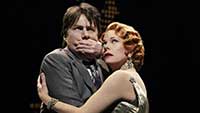Bullets Over Broadway, St James Theatre, New York – review

Simply sign up to the Life & Arts myFT Digest -- delivered directly to your inbox.

“They go wild, simply wild, over me,” sings Helen Sinclair, an ageing diva, in a deluded attempt to persuade David Shayne, a fledgling playwright, of her enduring appeal. Sinclair, portrayed by the wonderfully self-assured Marin Mazzie, is one of the reasons to see Bullets Over Broadway, the new musical birthed by Woody Allen from his 1994 movie of the same title. The Broadway show makes a Sinclair-sized effort to persuade us of the value of early-20th-century songs shoehorned into a 1929 setting. The attempt is intermittently enjoyable, extremely well crafted by the director/choreographer Susan Stroman, and progressively unthrilling.
The story unfolds with delectable naughtiness: the spectacularly untalented showgirl Olive Neal, given braying brassiness by Helene Yorke, dances the “Tiger Rag” at Nick’s Club, a pre-Depression Manhattan nightspot owned by her gangster boyfriend Nick Valenti. Portrayed by Vincent Pastore (The Sopranos’ Big Pussy), Nick is determined to make his nagging tootsie a star, so he bankrolls a Broadway play written by Shayne. Ghost re-written by Cheech, the goon assigned to guard Olive, the drama gives Allen a chance to flesh out a favourite theme: inside every artist lurks a fraud.
Some of the classic and little-known songs chosen by Allen, which have been given expert musical adaptation and additional lyrics by Glen Kelly, signify another kind of larceny: they were popularised by black entertainers but here are delivered by a large ensemble more lily-white than Lapland. Apparently, Allen doesn’t realise that, in a cartoonish Broadway musical these days, African-Americans are allowed to be gangster as well as gangsta. Ironically, the show reaches its entertainment climax in Act One when Cheech and his fellow mobsters do a gunfire-fast tap to “Taint Nobody’s Biz-ness If I Do”, a tune recorded separately in the 1920s by a holy trinity of female African-American blues singers: Sara Martin, Alberta Hunter, and Bessie Smith.
The second act advances the story efficiently: Sinclair and Shayne, portrayed by an anxiety-ridden Zach Braff, have an affair, and Cheech, portrayed by the charming Nick Cordero, demonstrates how to make a Broadway-related killing. But the evening’s lack of delirious pleasure eventually reminds the experienced theatre-goer, if not the casual patron, of more inspired outings by this creative team.
The pin-striped suits are reminiscent of costumer William Ivey Long’s work on the 1992 revival of Guys and Dolls; the low jokes and old-fashioned Broadway borrowings recall Mel Brooks’s 2001 musical adaptation of The Producers, also directed by Stroman. And the choreography, joyful as it sometimes is, cannot resist comparisons to Stroman’s more inventive work on the 1992 Gershwin extravaganza Crazy for You.
As to where this production fits in Allen’s career, the musical provides an opportunity for him to recycle jokes about sex and Spinoza, and there’s a politically incorrect remark about Irving Berlin that has some people crying racism but gave me my biggest laugh of the night. Allen recently told an interviewer that he finds working in the theatre insufficiently stimulating. That’s roughly how I would describe the musical Bullets Over Broadway.
Comments